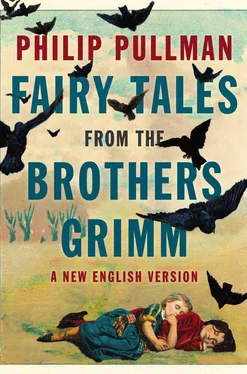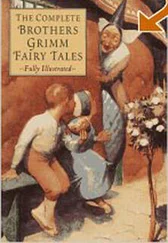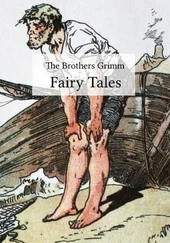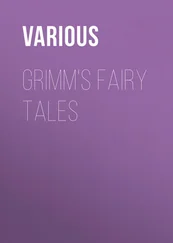‘I’ll show you what he’ll get if he doesn’t,’ Trina said, and seized the stick from under the bed. ‘I’ll take this stick and I’ll wallop him. I’ll tan his hide, you see if I don’t. Like this!’
And she whacked the bed again and again with such hearty blows that dust and feathers and breadcrumbs flew high into the air. Unfortunately, as she raised her stick for the last time, she hit the jug of honey on the shelf above. It broke into several pieces, and honey dripped down the wall and on to the floor.
‘Well, there goes the goose,’ said Heinz. ‘And the gosling. And I don’t suppose they’d’ve needed much looking after anyway. Hey, it’s a good job the jug didn’t fall on my head. Where’s that toast gone?’
He found it on the floor, butter side down, and used it to mop up some of the honey running down the wall.
‘Here you are, darling,’ he said. ‘You have this last bit.’
‘Thank you, sweetie,’ she said. ‘I gave myself a fright there.’
‘We need a rest, that’s what it is. Doesn’t matter if we get up a bit later than usual.’
‘Yes,’ she said with her mouth full of toast, ‘there’s plenty of time. Like the snail that was invited to the wedding, and he set off nice and early, and arrived just in time for the first child’s baptism. “More haste, less speed,” he said as he fell off the fence.’
* * *
Tale type:AT 1430, ‘Air Castles’
Source:a story in Eucharius Eyering’s Proverbiorum Copia ( Plenty of Proverbs ; 1601)
Similar stories:Aesop: ‘The Milkmaid and her Pail’ ( The Complete Fables ); Alexander Afanasyev: ‘The Daydreamer’ ( Russian Fairy Tales ); Katharine M. Briggs: ‘Buttermilk Jack’ ( Folk Tales of Britain )
There are many variations on the old idea of the daydreamer who speculates on what she’ll do with the milk she’s taking to market, and imagines the fine dress she’ll buy, and tosses her head to show how elegant she’ll look, and in doing so spills the pail she’s carrying on her head and loses all the milk. It could have any setting and be spun out any number of ways; but here I liked the mutual fondness of this bone-idle pair and the deep contentment they feel in their slovenly ways.
A man and his wife lived in a remote valley, all alone except for their little son. One day the wife went into the woods to gather some pine branches for the fire, and she took little Hans, who was only two years old. It was springtime, and since the little boy loved the bright colours of the flowers, she wandered with him further and further into the forest.
Suddenly two robbers sprang out of the bushes, seized the mother and child, and made off with them deep into the darkest part of the forest, where no innocent human being went from one year’s end to the next. The poor woman begged the robbers to set her and the child free, but she might as well have said nothing: they were deaf to her sobs and pleas, and drove her on without mercy through the briars and the brambles for two hours, until they came to a large rock with a door in it.
The robbers knocked, and the door opened. They made their way along a dark passage that led into a large cave, where a fire was burning on the hearth. On the walls hung swords and sabres and other deadly weapons, their blades glittering in the firelight, and in the middle of the cave there stood a black table where four other robbers sat playing dice. The chief robber sat at the head of the table, and when he saw the woman and her child, he stood up and spoke to her.
‘Stop crying,’ he said. ‘You’ve got nothing to fear as long as you do the housekeeping for us. You sweep the floor and keep everything neat and tidy, and we’ll treat you well enough.’
When he’d said this, he gave them some bread and meat, and showed her a bed where she and the child could sleep.
They stayed with the robbers for some years, and Hans grew big and strong. His mother told him stories and taught him to read with the help of an old book about knights and chivalry that she’d found in the cave.
When Hans was nine years old, he made himself a heavy club out of a pine branch that he’d stolen from the robbers’ woodpile. He hid it behind his bed, and then went to his mother and said, ‘Mama, I need to know, and you must tell me: who is my father?’
The woman said nothing. She didn’t want to tell him anything about their life before the cave, because he might become homesick, and she knew the robbers would never let him leave; but it broke her heart to think that Hans would never see his father.
That night, when the robbers returned from one of their criminal raids, Hans took out his club, went to the chief, and said, ‘Now I want to know who my father is. My mother won’t tell me, so I’m asking you, and if you don’t tell me, I’ll knock you down.’
The chief laughed, and gave Hans such a clout that he fell over and rolled under the table. He didn’t cry or make a sound; he just thought, ‘Let some time go by, and when I’m bigger, he’d better watch out.’
After a year had come and gone Hans took out his club, blew the dust off it, swung it this way and that, and thought, ‘Yes, it’s a good strong club.’
When the robbers came back early next morning, they were in a drinking mood. They drained so many jugs of wine that their heads began to droop. Hans was waiting for that, and he took his club and stood in front of the chief and asked him again: ‘Who’s my father?’
As he’d done before, the chief gave him a clout on the head, and once again Hans fell down. This time, though, he bounced up at once, took a tight grip of his club, and gave the chief and all the robbers a beating that left them so dazed and battered that they couldn’t move. His mother was watching from the corner of the cave, and she was amazed at his strength and his courage.
When he’d finished he turned to her and said, ‘You see, I’m serious about this. I want to know who my father is.’
‘Well, my brave Hans,’ said his mother, ‘let’s go and look for him.’
While she looked through the keys hanging from the chief’s belt, Hans filled a large flour sack with as much gold and silver and jewellery as it would hold. Then he swung it up on his back and followed his mother out of the cave.
And when he stepped out of the dark into the light of day and saw the trees, the flowers, the birds, the sun in the bright sky, Hans was amazed, and stood gaping around at everything as if he’d lost his wits. Meanwhile his mother was looking around to find the way home, and soon they set off; and after walking for a few hours they came back to their little house in the valley.
Hans’s father was sitting in the doorway, and when he learned that this woman was his wife and this strapping boy was his son he wept for joy, because he’d given them up for dead a long time before.
Young as he was, Hans was a head taller than his father, and much stronger by far. When they went into the house, Hans put the sack down on the bench by the fire, and at once there was the sound of cracking and breaking, and first the bench collapsed and then the floor gave way, and the sack plunged down into the cellar.
‘Good grief, boy, what have you done?’ said the father. ‘Are you going to demolish the whole house?’
‘You needn’t worry, father,’ said Hans. ‘There’s more than enough gold and treasure in that sack to build a whole new house.’
Sure enough, Hans and his father soon began to build a fine new house. What’s more, they bought some land around it, and some cattle, and set up a farm. When Hans walked behind the plough and pushed the blade deep into the soil, the oxen hardly needed to pull.
Читать дальше












